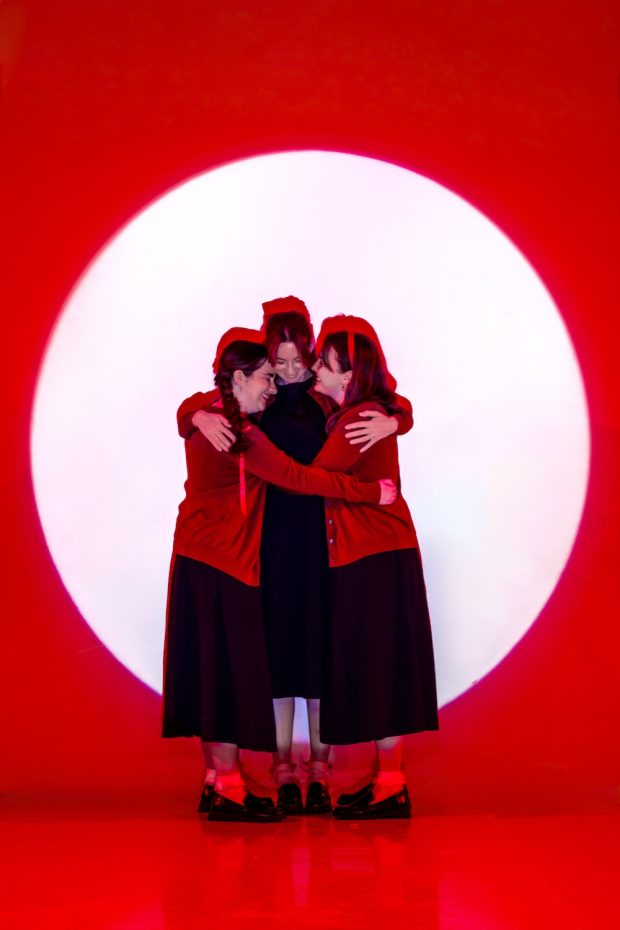
Review: FEMOID. at The Blue Room Theatre
FEMOID. at The Blue Room Theatre
Friday, January 31, 2025
Presented by Vixen Theatre Company, this feminist piece directed by Izabella Day explores the impact of violent misogyny on the lives of a trio of teenagers through different stages of their lives with wit, courage and grace. The trio of performers embody their characters with precision, and expert design juxtaposes the violence of the work’s subject with the innocence and beauty this violence attempts to defile with great, heartbreaking impact.
The action begins with Rory (played by Iris Warren) and Piper (played by Roisin Wallace-Nash) on stage. They discuss Caesar, who famously uttered the words alea iacta est, the die has been cast, as he crossed the Rubicon and passed the point of no return, and how this famous utterance has been co-opted by the incel movement. The two will occasionally return to this more muted setting of low lights and philosophical meditations, almost outside of the world of the play, as the work unfolds.
Rory, Piper, and Olive (played by Natasha Pearson) are a group of friends in high school on the verge of adulthood. All three performers do a wonderful job of presenting their characters as optimistic, innocently girly, and joyful, situating the audience firmly in the inner world of this group of close-knit high school friends. Their banter is hilarious and immediately evokes each of their unique personalities.

Rory comes across as a little bit precocious, and Warren’s confident smirk playing Rory as she says things specifically designed to shock the more conservative Olive, really rounds out the characterisation. Equally, Pearson, as Olive, does a sterling job of playing up the vibe of chastity and innocence, marking a perfect foil to Rory. Wallace-Nash as Piper rounds out the trio as the middle ground between the two, playing the diplomat when required—the glue that holds the group together.
It is easy to get lost in the lovely femininity of it all, with the gorgeous red lighting (kudos to Lighting Designer Jolene Whibley) and the back wall with its dried wildflower bouquets dangling from hooks. The performance of the actors is enchanting, and the promise and potential of their futures feel so bright. In their world, their biggest concern is the upcoming dance. As an audience member, knowing that this beautiful, unmolested state of things cannot last, it becomes almost painful wondering when the violence will begin to creep in.
Interspersed in between scenes where the friends go about their lives, verbatim posts from online incel forums, including text and videos, are projected onto the back wall. The change is stark and harsh. A voiceover reads some of these vile posts, and the violence of the language contrasts sharply with the beauty of the performed scenes.

Beginning from their late teenage years through the next phases of their lives, one by one our protagonists fall victim to misogynist violence played out in different scenarios. The innocence of their world is punctured, their confidence wavers, but, each time, their loving friendship helps to heal their wounds. It is in these scenarios, particularly, that Wallace-Nash as Piper shines as a performer, playing the peacemaker and exuding wisdom and kindness. In terms of the writing, what is particularly poignant is moments highlighting how the culture of victim blaming, certainly aided by their upbringing in Catholic school, is something these girls need to learn how to overcome, even amongst friends. This is particularly thoughtful as an inclusion and makes this work detailed, rounded, and well-informed.
The simple set of three black steps allows the performers to effectively create distinct scenes, in and out of time, and as time progresses in the world of the play, by simply moving the steps into different configurations in between scenes. Despite the work extending beyond the girls’ time in high school, there are no costume changes. Keeping them in their school uniforms throughout feels like another impactful design choice. It juxtaposes the misogynist violence with the vulnerability of the characters well and does an excellent job of really bringing home the extreme hatred of women by groups such as incels in a way that simply reading about it couldn’t hope to do. With these thoughtful design choices, FEMOID. does a thorough job of exploring this difficult, awful subject that doesn’t merely rely on the violence of the real-world content from the incel forums they include.
For a while there, it seems that once the innocence is lost, there is no ray of sunshine on the horizon, but FEMOID. still manages to find a way to end on a hopeful, determined note. This feels important in a piece exploring a topic with such a heavy impact on society, one that often feels very difficult to overcome. In a lovely full circle moment, the work ends as it begins, with Rory and Piper onstage, once again discussing Caesar’s words, alea iacta est. Projecting strength, they announce that the die is cast, and that this time, they are the ones doing the casting.
MELISSA KRUGER
